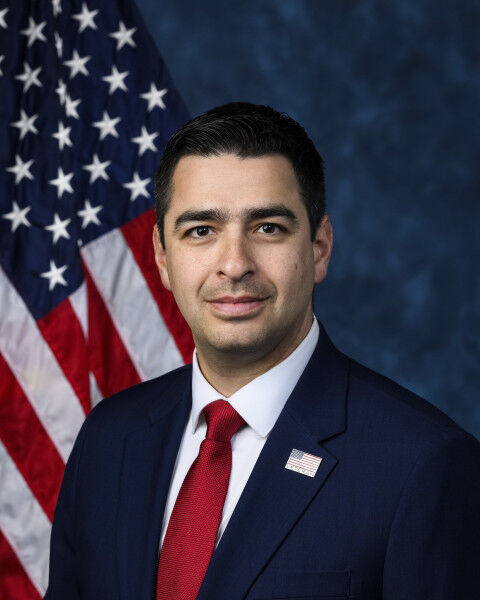New CU Regent Jack Kroll discusses key problems facing CU and the higher education community
Having won a hard-fought 2016 Democratic primary race for the open seat on the University of Colorado Board of Regents and then cruising uncontested in the general election, 1st Congressional District Regent Jack Kroll, D-Denver, says he is ready to fight the important battles facing the university.
Not long before his, 4th Congressional District Regent Sue Sharkey and At-Large Regent Heidi Ganahl’s swearing-in on Jan. 6, Kroll spoke to The Colorado Statesman about his vision for CU and the many issues that are currently challenging the state’s higher education system. As is so often the starting point in conversations about higher education in Colorado, Kroll discussed the public funding dilemma.
In Colorado, as in other states throughout the nation, tax dollar flow toward higher ed seems to be on a perpetual downward slope and tuition on a resulting upward one. The University of Colorado, like many of the state’s institutions, is deliberating methods to generate revenue without continuing down the seemingly never-ending path of spiking tuition rates. Kroll wants to play a key part in finding that silver bullet solution. As his new role commences, he told The Statesman he wants to focus his first term on helping the Board of Regents find innovative ways to acquire revenue, stabilize tuition rates and enhance the quality and diversity of CU campuses.
A Colorado native and CU alum, Kroll attended South High School in the heart of Denver, graduated with English and Economic degrees from CU-Denver, and has served as an assistant director of admissions in the CU-Boulder admissions office since 2011. With Michael Carrigan vacating the 1st Congressional District slot on the Board due to term limits, Kroll was encouraged by many factors to run for the seat.
“I’m from a family with two educated parents,” explained Kroll, “… so going to South High School really exposed me to this whole other world where students were asked about college in a different way than me. I was always asked where I was going to go to college. But when I showed up at South High School as a sophomore, instead of asking where I was going to school, the question was if I will be going to school. There are a lot of students I went to school with and that I have worked with as an admissions officer who simply could not afford to go to college. What I hope to accomplish as regent is to enfranchise more people into the opportunity of getting a college education.”
Kroll says his to-do list as a regent has undoubtedly been influenced by those past experiences. One of his top issues, and one that is especially personal to him, is the concept of high tuition rates preventing low-income students from receiving a college education.
Expensive tuition
Without a doubt, expensive tuition rates can be a real dream breaker. They are a problem plaguing public universities throughout the nation. Many factors have influenced the hefty rate hikes for public colleges, including the use of more advanced resources, economic inflation and increasing consumer demand. But, bottom line, the spending cuts that states have implemented and their resulting reduction in higher education funding have been a big slice of that pie.
While state funding for public colleges has been consistently decreasing since the 1980s, states have been cutting higher education funding at especially dramatic rates since the 2008 Great Recession. According to a study conducted by The Center on Budget and Policy Priorities, nearly every state is spending substantially less on higher education than before the recession, and overall, state spending on public colleges throughout the country has decreased by a glaring 21 percent since the recession.
Colorado is no stranger to this situation. In fact, the state’s higher education funding troubles are even more pronounced due to the ratcheting effect created by the Taxpayer’s Bill of Rights, Amendment 23 and other constitutional tax-limiting measures, gobbling up the limited revenue streams.
Since 2008, Colorado has reduced public college funding by 18 percent, including adjustments for inflation. These cuts caused Colorado’s higher education system to plummet toward the bottom of one organization’s national rankings, outlined in a report published by the State Higher Education Executive Officers Association. With a modest higher ed budget of $3.7 billion, Colorado ranks 47th of all states in terms of the amount of state funding provided per college student. Another report issued from the Young Invincibles research and advocacy group gave Colorado abysmal “F” grades for its insufficient per-student funding of higher education.
This is where Kroll really sees the challenge in front of him unfold. “CU has been hurt by this national trend of declining state support for higher education,” he said. “Adjusted for inflation, CU has faced a 50 percent decrease in funding per-student that comes from the state over the last 25 years. That’s incredible, especially since we are actually one of the most educated states in the nation.”
Kroll notes that while tuition rates for public colleges around the nation have increased by 300 percent in recent decades, at CU they’ve increased by an overwhelming 400 percent.
“The reality is that, as state support for higher education has declined across the country, this has created a higher education marketplace that is overly competitive, and so they’re basically operating tuition-revenue dependant educational entities,” explained Kroll. “I want to make sure that every qualified Colorado student, regardless of socioeconomic status, considers a University of Colorado campus as an option to receive a college education.”
Pressuring state legislators to increase higher education funding is one obvious method of amplifying the resources available for the University of Colorado. But Kroll is realistic about the difficulties of getting more money from the Legislature and knows the likelihood that of finding any additional funding is minimal.
Lending a solution
Kroll has developed several other plans he hopes will generate revenue for the school without shifting the financial burden onto the students.
Kroll says he will attempt to convince his fellow regents to gradually implement a new CU loan program. Student debt is a severe problem facing the entire country. The high public college tuition rates require many students to obtain outside federal loans, the loans often entail outrageous interest rates, and the extensive debt prevents many graduates from possessing the dispensable spending money required to purchase services and contribute to the economy.
Rather than taking loans from outside or federal sources, Kroll wants CU to begin providing student loans internally. He says he believes that an internal loan program accompanied with reasonable interest rates would create a new revenue stream for the school and alleviate the debt loads of the graduates.
“There’s a principal-agent problem that exists with the current loan structure of higher education,” Kroll said. “The university benefits from the immediate short-term value of that cash flow, but the U.S. government profits most from the student loan payments, and so universities have this incentive to set their tuition rates at the highest level because they’re only getting that short-term payment off the bat. What we would do is look at certain students coming from low socioeconomic backgrounds who need additional capital financing. By providing the loans we can lower the overall cost for those students and create a more sustainable revenue stream for the universities.
It’s all online
Kroll also intends to generate revenue by expanding the CU online educational programs and by capitalizing on the lucrative profits that online courses provide.
“Online education is here,” stated Kroll. “It’s here, and it will continue to take up a greater percentage of the student enrollment. We’re no longer bound by the sense of geographic proximity when it comes to enrolling students, and so we can get credits and income from students in the middle of Sub-Saharan Africa, or South America or Korea. We can take the additional excess revenues that are generated from more online courses to subsidize our brick and mortar program, and through that we can also enfranchise many more students to get a college education.”
Kroll contends transfer credits can also help pad CU’s cash flow. Improving the ability for CU to accept transfer students and absorb transfer credits would allow the university to attract more out-of-state or international students.
“We have a moral obligation to serve transfer students and help them finish their degree,” said Kroll. “But the transfer credits also have illiquid assets. They have something that is valuable but it’s hard to spend. And this would give us a market advantage to create liquidity in the transfer student market so we can enroll more of these students, produce more college degrees and leverage those good economic incentives.”
Cutting back administrative costs and athletics spending
Administrative costs are at the front of Kroll’s chopping block, because he believes many of them are excessive and unnecessary.
“Every university has fat around the edges, and we spend way too much on administration costs. We’ve got too many administrative costs and functions, no one knows what they do or what they provide, and eliminating those costs can help improve efficiency.”
Kroll is also gearing-up to tackle the problem of athletics programs receiving too much school funding. During his career and throughout his campaign, Kroll has consistently opposed spending an exorbitant amount of dollars on athletics programs instead of on academic resources.
Focusing on diversity
Promoting diversity is a top priority where Kroll would like to redirect funds and increase resources.
“Until we have a university that reflects the population of the state of Colorado, we have not accomplished enough in our mission towards this end,” said Kroll. “Diversity creates a better learning environment for all students, but you have to pay for diversity. You have to invest in it. And it’s not about just giving them money to go to school, but it’s about providing opportunities, communities and support services for the students.”
CU is currently modifying a new scholarship program to enhance its socioeconomic diversity. Most of the scholarships that the university previously provided were granted to students based on superior test scores, even when those talented students were raised in affluent communities and did not require financial assistance. Kroll instead wants to promote a scholarship program that targets talented students from low-income communities and considers the socioeconomic background of those applicants.
“The new Innovation Grant program is very exciting because it’s something that CU has the chance to lead on. We just funded the Innovation Grant through to adapt a pre-existing tool that we have in the admissions office for evaluating overachieving among low socioeconomic students. We currently use that tool for admissions decisions to evaluate how well the students performed given their life circumstances or environment, which is a more holistic evaluation of the students.
“We’re now looking at ways to adapt that tool into scholarship funding. That’s how we need to allocate scholarship funding moving forward. We don’t need to be so much interested in students who have off-the-chart scores. But in a public university we should invest our resources in students who need financial assistance and who might not otherwise get a college degree, because the gains we get there are significantly greater for society and the university as a whole.”
Kroll told The Statesman he hopes that these ideas for generating revenue and allocating funds will help stabilize the tuition rates of the university and maximize the quality of its programs.
“Education is a private good and a public good, Kroll said. “It benefits both the individual and society. We need to stop referring to college education as a higher education, and instead refer to a college degree as just an education that is part of every student’s path to the workforce, and to being productive and active citizens.”
Looking back on the election, perhaps it was “Roll with Kroll,” his catchy campaign slogan, that won his race, but he contends it was nothing more than hard work and shoe leather, concepts Kroll pledges to continue to practice in order to solve big problems with big ideas as the new regent for the Colorado’s 1st Congressional District.











